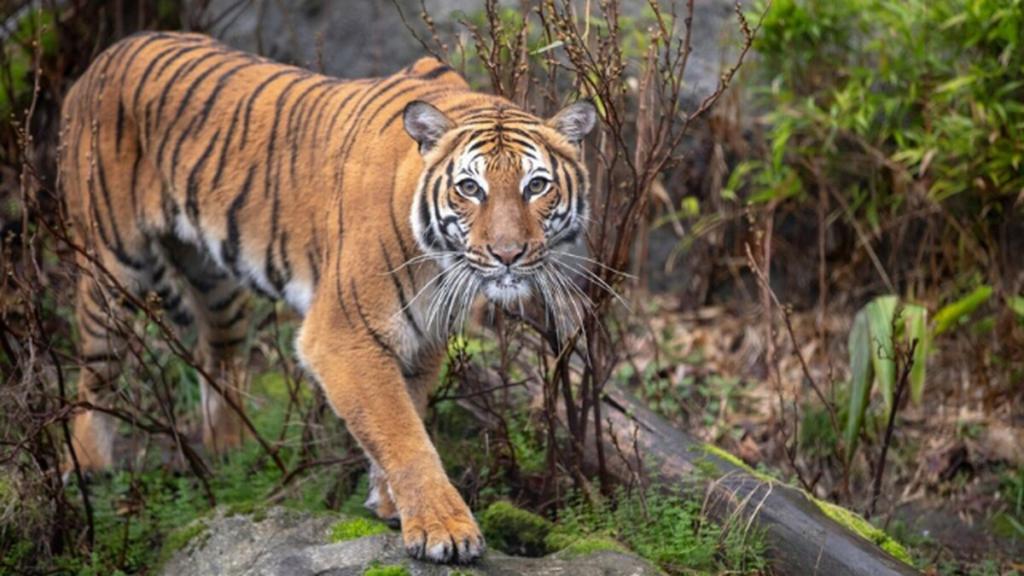The Woodland Park Zoo’s newest tiger, Azul, has a dubious claim to fame: She was one of the first animals in the world to be diagnosed with COVID-19 last spring while living at New York’s Bronx Zoo.
While there’s an inherent risk in transferring an animal from one zoo to another, Woodland Park isn’t worried that Azul could bring the coronavirus to its animals.
She fully recovered last April, along with other tigers and lions that had tested positive. As she continues adjusting to her new home, Woodland Park hopes she’ll be the mother to future tiger cubs.
The 5-year-old Malayan tiger flew to Seattle with her New York City zookeepers in September. She entered the public enclosure this week after a standard 30-day quarantine and time to adjust to her new home.
Azul tested negative before leaving New York, Woodland Park Zoo director of animal health Darin Collins said. She also went through the standard medical examination animals get before moving between zoos: a physical exam, blood tests and other screenings to ensure she was healthy.
“We would never have let her come here if we felt like she was still shedding the virus,” Collins said. “We hope the COVID history is just history in her past and not something we have to concern ourselves with in the future.”
Woodland Park had followed the Bronx Zoo’s outbreak since last spring and had access to Azul’s medical records, Collins said. Woodland Park hasn’t tested Azul because she hasn’t had any COVID-19 symptoms, but it collected and frozen fecal samples that could be tested retroactively.
“She never missed a meal and never behaved as if she didn’t feel well,” Collins said. “We didn’t have any reservations about clearing her from quarantine.”
Azul’s sister Nadia was the first animal in the world to test positive for the coronavirus last spring. Bronx Zoo staff noticed Nadia had a dry cough in late March, and soon several other lions and tigers all showed symptoms.
Four tigers (including Azul) and three lions tested positive. Scientists were still scrambling to ramp up coronavirus testing in New York, the epicenter of the pandemic, and the tests used for the animals were different than those effective on humans, the zoo clarified.
“You cannot send human samples to the veterinary laboratory, and you cannot send animal tests to the human laboratories, so there is no competition for testing between these very different situations,” Bronx Zoo chief veterinarian Dr. Paul Calle said in a statement.
The animals were only mildly ill and soon recovered without special treatment. Big cats do develop coronavirus antibodies when they’re infected that presumably protect them from future infection, Calle said. But like humans, scientists don’t know how long the antibodies last.
The zoo thinks the cats contracted the disease from an asymptomatic staff member. The Bronx Zoo had been closed for weeks, and even when it’s open, guests can’t get close enough to lions and tigers to infect them. Personal protective equipment (PPE) was in short supply at the time, and staff didn’t wear masks around animals early in the pandemic, Calle said.
“Once we recognized the cause, we implemented PPE — masks and gloves and protective clothing — while working around the cats,” Calle said.
Woodland Park Zoo has taken similar measures since last spring to protect both humans and animals. Zoo staff members keep their distance from animals and wear PPE when interacting with them or preparing food.
A small menagerie of other zoo animals have tested positive since last April, the U.S. Department of Agriculture (USDA) reports: three tigers at Zoo Knoxville in Tennessee, three snow leopards at the Louisville Zoo in Kentucky and three gorillas at the San Diego Zoo.
Woodland Park hasn’t tested any animals for the coronavirus, Collins said, because none have had symptoms consistent with the virus. The zoo needs permission from the Washington Department of Agriculture and the USDA to conduct tests.
Azul has adjusted well to her new environment, Collins said. She’s confident and used to being around people — a result of being partially raised by humans when she was born at the Bronx Zoo.
“She’s an ideal candidate for introduction to another tiger, and one day that will happen here,” Collins said. “As she matures, we want that level of confidence to translate into her ability to associate with a male.”
Azul was sent to Seattle under a breeding recommendation that paired her with 10-year-old Bumi, Woodland Park’s only other Malayan tiger.
The zoo hopes the pair will produce a litter of Malayan tiger cubs, which would be Woodland Park’s first since 2006. Malayan tigers are critically endangered and there are only about 200 left in the wild.
“I have every belief she’s going to be 100% capable and confident in being a mate to Bumi,” Collins said. “Confidence translates into being a good mother, too.”



